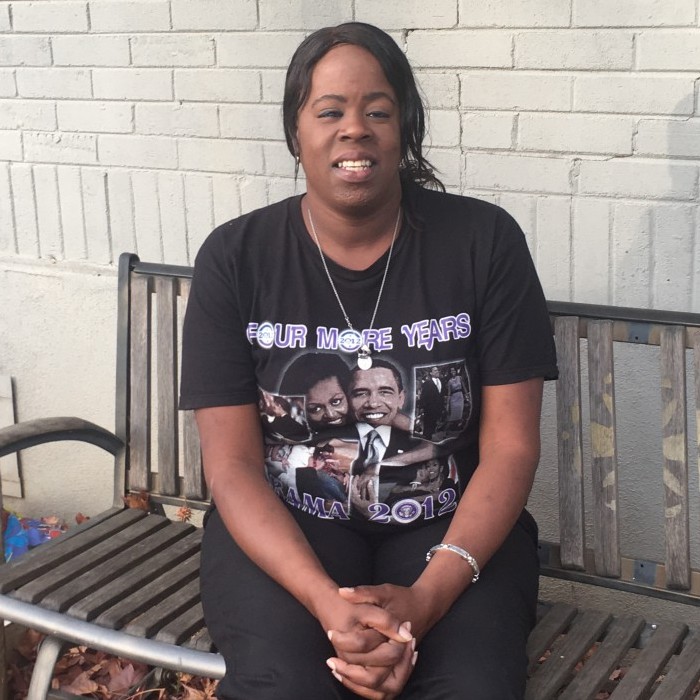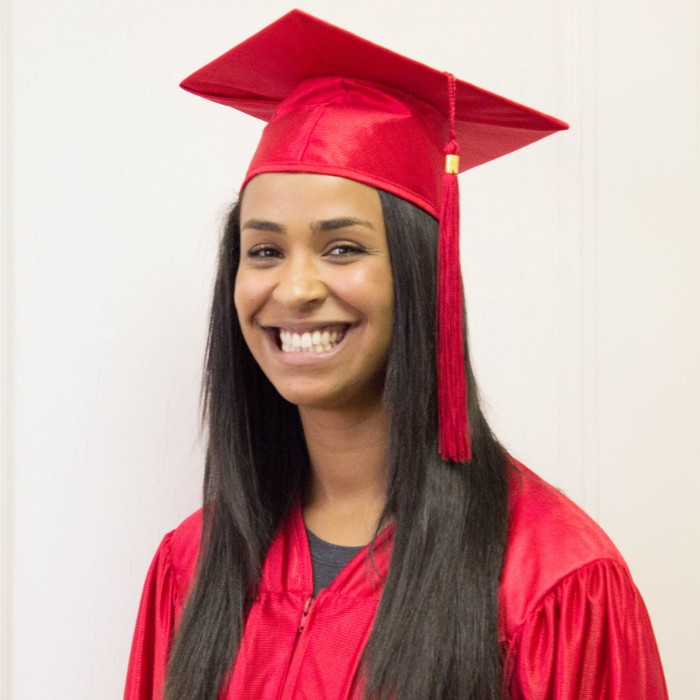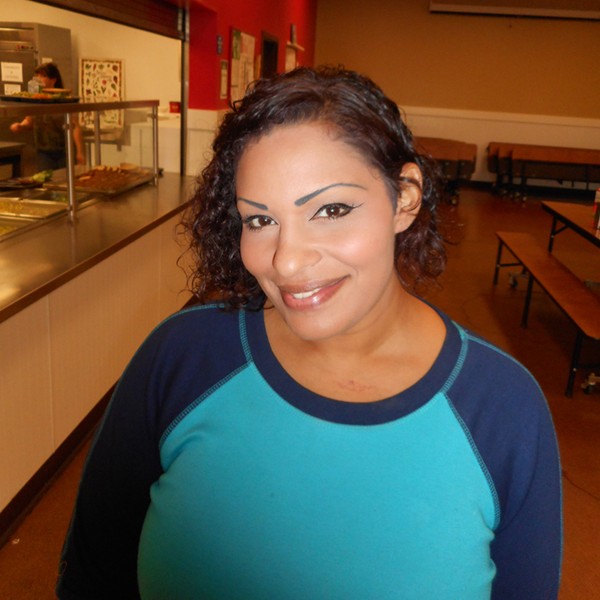Saint John’s Program for Real Change has helped to provide Real Change in the lives of more than 30,000 women and children since its beginning in 1985.
Our year-round residential program helps women in crisis and their children reach stability and sustainability through comprehensive, trauma-informed and responsive services. Our proven methods help families improve health and safety, function independently, reintegrate into the workforce and reach financial self-sustainability.
35,000 Lives Changed
As the largest program of its kind in Sacramento, we serve up to 550 women and children each year. On average, we provide 675 comprehensive service hours per month to every family we serve.
- 96% of the women who complete our job training program secure non-subsidized employment.
- 75% leave Saint John’s for stable or permanent housing and optional after-care services.
2022 Impact
In 2022, we served 404 clients — 260 women and 144 children.
No longer homeless. No longer helpless.
Determination is an integral part of the stories of the mothers who make it through the Saint John’s program. That’s because women suited for Saint John’s aren’t just ready for change. They’re ready to fight for it. And, more often than not, they’re strong enough to win.
“I knew I was going to be one of the women who made it. I had made a choice to leave all of the old behaviors at the door and I was more open-minded and willing than ever before to fight for my life. It was not by any means easy to do.”
Julianna, Saint John’s alum

After the death of her mother, Natisha was overwhelmed with stress. She began experimenting with drugs and settled on meth to mask the pain. Over the course of her 10-year addiction, she lost her job and her apartment and was living in a tent by the river with two of her three children, Daeveon (8) and Jasmine (6) and their father. CPS eventually intervened and removed the two children from their custody, leading Natisha to Saint John’s and her boyfriend to an outpatient rehab. After putting in the hard work necessary while at Saint John’s, Natisha was reunited with all three of her children, who joined her during her final months at Saint John’s.
“My older son, Trevonte, had been living with his abusive father since he was nine, when I became homeless,” reflects Natisha. “When he was 12, he escaped and hitchhiked – by himself! – to Sacramento to find me, and for a time, he stayed at the Winters Shelter for runaways. When CPS returned my two younger children to my custody, Trevonte was able to come too.
“I was beyond grateful to Saint John’s – without them, I never would have been reunited with my children,” adds Natisha. “They taught me how to be a mother again, and they provided me with the skills I needed to have a career.”
Natisha now works in Environmental Services at UC Davis Medical Center. She loves her job, has recently remarried (to the father of her two younger children, who is now also sober), and together, the family has established a healthy, happy lifestyle.

Before coming to Saint John’s, I had struggled with addiction for about three years and was in and out of treatment centers. This was followed by a long list of relapses, loss of family and friends. I was in a deeper hole than ever before, with absolutely no real life skills to prepare me or provide a light that would show me a way out.
I had finally reached my rock bottom when the father of my youngest child attacked me in front of my eldest, and while I was seven months pregnant with our child. This led me back to using drugs during my last trimester, resulting in a positive tox baby and CPS yet again taking my children from me. The pain of having your children ripped from your arms after childbirth is beyond comprehension, and something I wouldn’t wish on my worst enemy.
Little did I know that this experience would give me strength, and with that strength came hope, and an opportunity to change my life forever. This series of unfortunate events ultimately led me to that famous red door at Saint John’s Program for REAL CHANGE. I can honestly say that when I arrived I felt such relief. I knew I was going to be one of the women who made it. I had made a choice to leave all of the old behaviors at the door and I was more open-minded and willing than ever before to fight for my life. It was not by any means easy to do.
During my stay at Saint John’s, I had a lot of challenges to overcome, from CPS telling me my children were going to be adopted out, to my struggle with my decision to leave my abuser and the father of my child, to alleviating my debt, and tackling my mental health and low self-worth. These were just a few of the many issues standing between me and what I now know to be true happiness.
Saint John’s taught me employability skills, showed me how to create a budget and stick to it, offered counseling and a long list of classes and resources to help me address my problems and for once live in the solution. I had a change of perception and was seeing life through different eyes and yet somehow they were mine.
Every obstacle I overcame gave me the courage to keep going, and for the first time in a long time, I was actively participating in my own life. Today, my children reside with me in my own apartment with the help of the Saint John’s Independent Housing Program. I am not only employable but I am now the general manager of Club Pilates, and I absolutely love what I do. Today, I am sponsoring other women in recovery in hopes of carrying my testimony to other women that anything is possible.
It takes a village, and from the bottom of my heart, I want to thank Saint John’s for being my village. I am finally free!

Adrianna, a graduate of Saint John’s Program for Real Change, is an incredible example of how to overcome adversity through perseverance and faith.
A full-blown addict by 17, she has since lived through four stints at rehab, homelessness, a Stage 3 cancer diagnosis, and losing custody of her children. Like so many who struggle with the disease of addiction, for as long as she can remember, Adrianna never felt like she was good enough. “Addiction is about self-loathing,” she says. “We feel like we aren’t free to be our true selves, so we numb our feelings with drugs and alcohol.”
Adrianna’s story was an endless cycle of using, going to rehab, trying to put her life back together, and then – poof! – another relapse. Each time, the life she had carefully rebuilt fell apart a bit faster than the time before and she found herself falling to even deeper depths of despair.
But, Adrianna says calmly, “The last time was . . . different. I knew that although I might have one more relapse in me, I did not have one more recovery. If I fell down again, I didn’t think I was going to be able to get back up.” That realization shook her to her core.
Adrianna vividly remembers the moment when – standing in the shower at Saint John’s – she broke down and sobbed. Feeling beaten and hopeless, she decided at that moment to pray for help: “Get me through this, God, and I will honor you for the rest of my life,” she vowed through a steady stream of water and tears. “Show me how I can serve you.”
Today, Adrianna is proud to say that she has regained custody of her youngest son, has an apartment, a car, a job that she loves, and has emerged from the darkness of her past and into the light of day. She enjoys spending time with sober friends, going to the gym and play dates, shopping with her kids, and speaking publicly about her journey.
Homelessness in Sacramento
According to a 2022 report by Sacramento Steps Forward, 9,728 people experience homelessness on any given night in Sacramento County. That number increased by 67% from 2019 to 2022.
All of the women we serve live below poverty level and are dealing with multiple and complex issues that are barriers to holding a job and becoming self-sustaining:
- 86% suffer from substance use disorders
- 61% are victims of domestic violence
- 39% struggle with mental health conditions
- 65% have a criminal history
- 65% do not have a high school diploma
- 100% lack a stable work history or have never held a job
Many women also have physical health problems, unaddressed dental/vision needs, diabetes and poor nutrition.
Left unaddressed, the effects of these conditions can last a lifetime and cycle into the next generation through their children. Our program is not easy, and it is not for everyone. But we have seen it create Real Change in the lives of our alums and their families.